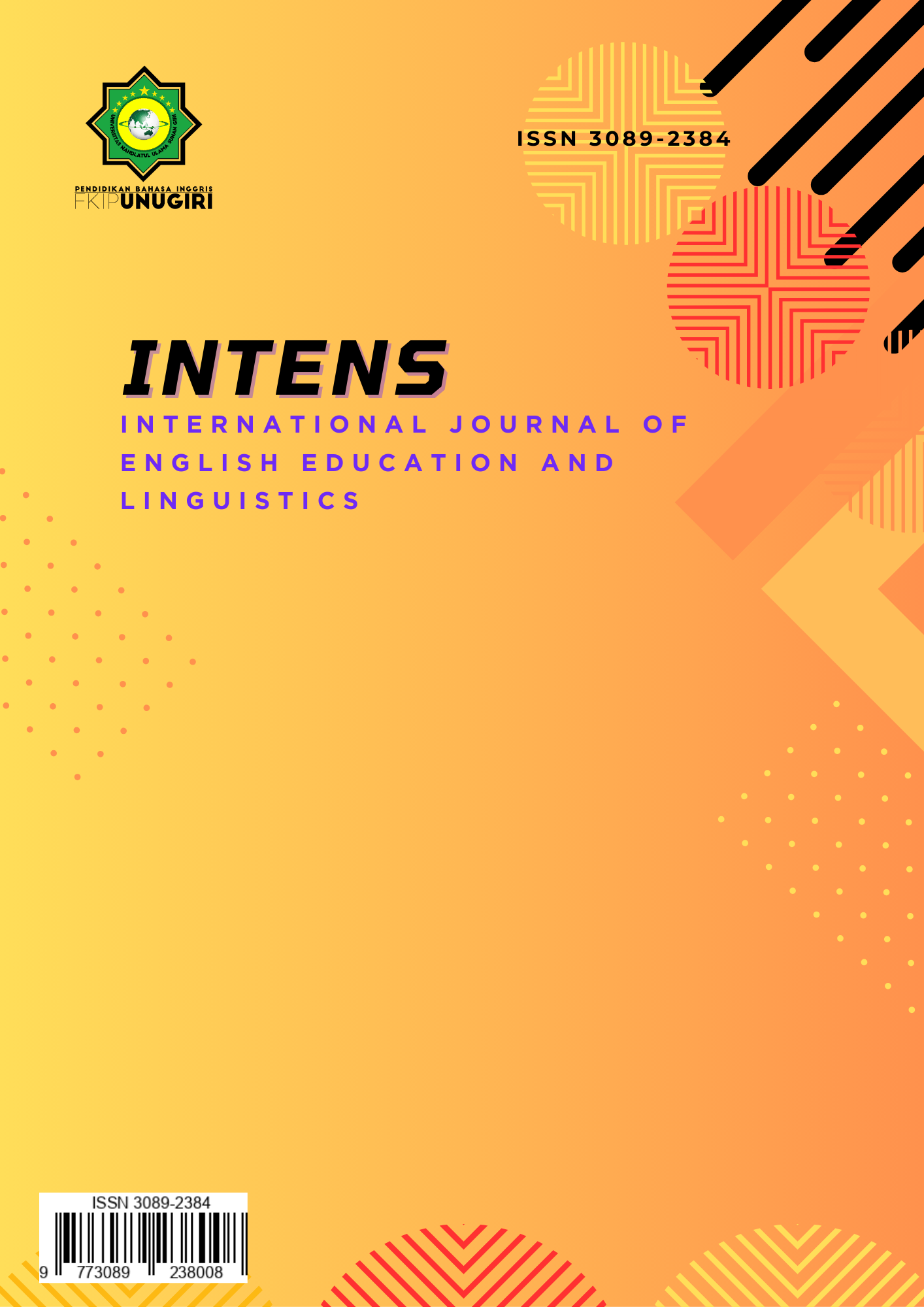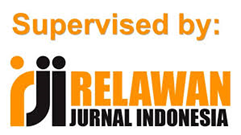ELEMENTARY STUDENTS DO LOVE SONG: Songs as Fun and Effective Media to Enhance Vocabulary Building for Elementary Students

DOI:
https://doi.org/10.32665/intens.v2i02.5086Keywords:
English Learning, Early Childhood, Educational Songs and FilmsAbstract
This study aims to describe how English Kids’ songs as media in teaching English to early childhood learners enhanced students’ vocabulary mastery. Considering young learners are naturally active, imaginative, and responsive to fun activities, songs become an appropriate approach to foster language interest and skills from an early age. The findings in this study revealed that English songs have been proven success in enhancing vocabulary for young learners. The catchy rhythms and repetitive lyrics help children memorize and imitate words within meaningful contexts, enrich children’s comprehension through audio/ audio visual context, cultural expressions, and simple verbal interactions that engage them actively. Observations, interview, and teacher reports indicated a significant increase in children’s interest of vocabulary mastery. The students’ vocabulary building is significantly improved when teachers play an active role in explaining the material, repeating key vocabulary, and facilitating interaction after the song is played. Therefore, it could be concluded that songs function not merely as entertainment but as meaningful, enjoyable, and effective tools in laying the foundation for English vocabulary at Islamic Elementary School, MI Unggulan Al Muhammad Cepu.
Keywords: English Learning; Early Childhood; Educational Songs and Films.
References
Ain, R. Q., & Nawir, A. R. (2022). Pictionary Game Its Effect to upgrade ESP Students Vocabulary M astery at SMKN2 PANGKEP. ELTIN JOURNAL, 31–38.
Alqahtani, M. (2015). The Importance of Vocabulary in Language Learning and How to be Taught. International Journal of Teaching and Education, III(3), 21–34. https://doi.org/10.20472/te.2015.3.3.002
Anggaira, A. S., Aryanti, N., Suryadi, S., & Tusriyanto, T. (2022). Songs for Teaching Vocabulary: English Learning Media for Preschoolers. Jurnal Obsesi: Jurnal Pendidikan Anak Usia https://doi.org/10.31004/obsesi.v6i6.3254
Creswell, J. W. (2007). Qualitative inquiry and research design: Choosing among five approaches (2nd ed.). New Delhi, India: Sage.
Fitria, O. R. (2021). The Important Role of English Songs in Learning English for Young Learners. J. Jurnal Dieksis, 1(1), 13–18.
Fridayanti, A., Tahrun, & Mulyadi. (2021). Increasing Kindergarten Students’ Vocabulary and Learning Interest Through English Kids Songs at Palembang Paramount School. In Proceedings of the International Conference on Education Universitas PGRI Palembang (INCoEPP 2021), https://doi.org/10.2991/assehr.k.210716.128
Hadi, M. S. (2019). The Use of Song in Teaching English for Junior High School Student. English Language in Focus (ELIF), 1(2), 107. https://doi.org/10.24853/elif.1.2.107-112
Ilinawati, I., & Dharma, Y. P. (2019). Improving Students’ Vocabulary Through Songs. JEES: Journal English Educational https://doi.org/10.31932/jees.v1i2.329
Islami, F. T. (2019). Using Song as a Media in Teaching Vocabulary to Young Learners Based on Total Physical Response (TPR) Method. Undergraduate Thesis. Bandung: Universitas Pendidikan Indonesia.
Isnaini, S., & Aminatun, D. (2021). Do You Like Listening to Music ?: Students’ Thought on Their Vocabulary Mastery Using English Songs. Journal of English Language Teaching and Learning (JELTL), 2(2), 62–67.
Istiana, Y., & Widodo, M. (2023). A Systematic Review of Technology Integration in Early Childhood Education. Early Childhood Education Development and Studies (ECEDS), 4(1), 31–26.
Kaswari, H., & Khasanah, evi uswatun. (2024). An Nuur The Journal Of Islamic Studies (https://ejournal.iaiamc.ac.id/index.php/annuur) | 22. An-Nurr, 14, 22–29.
Lestari, I. W., & Hardiyanti, N. (2020). Vocabulary Learning Autonomy Through Incorporation of English Songs: Indonesian EFL Students’ Perspectives. 3L: Language, Linguistics, Literature, 26(2), 94–104. https://doi.org/10.17576/3L-2020 2602-07
Maryanto, L., Ninik, S., & Mugiarso, H. (2014). Meningkatkan Motivasi Belajar Siswa Melalui Layanan Penguasaan Konten dengan Teknik Bermain Peran. Indonesian Journal of Guidance and Counseling - Theory and Application, 2(3), 1–8.
Mokhtar, M., Mayuasti, M., & Ikhsan, M. K. (2017). The Implementation of English Song in Building English Vocabulary at Murni Kindergarten Padang. Tell-Us Journal, 3(1), 25–35. https://doi.org/10.22202/tus.2017.v3i1.2520
Nufus, T. Z. (2019). Teaching English to Young Learners in Indonesia (Pros and Cons). English Language in Focus (ELIF), 1(1), 65. https://doi.org/10.24853/elif.1.1.65-70
Pinter, A. (2006). Teaching Young Language Learners. Oxford University Press.
Purnami, N. L. S. W. (2022). Fun Activities to Teach Vocabulary for Young Learners: a Library Research. E-Link Journal, 9(1), 19. https://doi.org/10.30736/ej.v9i1.609
Rusyda, S. El, & Suparman, U. (2022). TEACHING VOCABULARY THROUGH PICTIONARY GAME TO FIRST GRADE STUDENTS OF SMP AL-KAUTSAR
Shanahan, E. A., Jones, M. D., & McBeth, M. K. (2018). How to conduct a narrative policy framework study. The Social Science Journal, 55(3), 332–345.
Wahidin, W. (2017). THE INFLUENCE OF USING PICTIONARY GAME ON IMPROVING STUDENTS ’ ACHIEVEMENT IN LEARNING ENGLISH VOCABULARY AT THE SEVENTH GRADE STUDENTS OF SMPN 1 DAWUAN MAJALENGKA ENGLISH LANGUAGE TEACHING DEPARTMENT TARBIYAH AND TEACHER TRAINING FACULTY SYEKH NURJATI STATE ISLAMIC INSTITUTE.
Widhiprasetya, G. A., Mujiyanto, J., & Sutopo, D. (2021). The Effectiveness of Children YouTube Songs and Flashcard Games to Teach Vocabulary to Kindergarten Pupils. English Education Journal, 11(4), 528–538. https://doi.org/10.15294/eej.v11i1.48838
Yin, R. K. (2009). Case study research: Design and methods (4th ed.). Thousand Oaks, CA: Sage Publications.
 Pdf Download: 0
Pdf Download: 0













